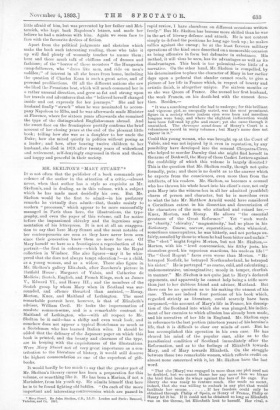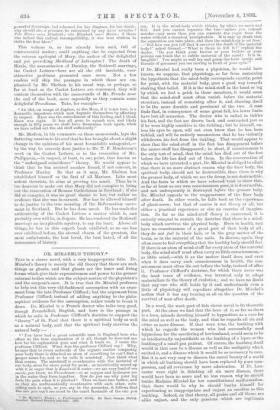MR. SKELTON'S "MARY STUART."* IT is not often that the
publisher• of a book commands pre- cedence of the author in the attention of a critic,—almost never, when that author has a style so exquisite as Mr. Skelton's, and is dealing, as in this volume, with a subject which be has made most decidedly his own. But Mr. Skelton would be the first to admit—in his prefatory remarks be virtually does admit—that, thanks mainly to modern " processes," which appear to be more successfully managed in Paris than here, the illustrations, the typo- graphy, and even the paper of this volume, call for notice before the impassioned chivalry and the ingenious argu. mentation of his letterpress, It is not at all an exaggera- tion to say that here Mary Stuart and the most notable of her contemporaries are seen as they have never been seen since their generation knew them no more for ever. Of Mary herself we have as a frontispiece a reproduction of the portrait—the first in colours—which belongs to the Royal collection in Windsor. She also figures—may it be whis- pered that she does not always tempt adoration P—as a child, as a young woman, and as a widow. There also figure in Mr. Skelton's gallery Elizabeth, after Zucchero's picture in Hatfield House ; Margaret of Valois, and Catherine de Medicis ; Scotch, English, and French Kings, such as James V., Edward VI., and Henry III. ; and the members of the Scotch group by whom Mary when in Scotland was sur- rounded, and oftener thwarted than assisted, Moray, Morton, Knox, and Maitland of Lethington. The most remarkable portrait here, however, is that of Elizabeth's adviser, William Cecil. He looks the impersonation of resolute common-sense, and is a remarkable contrast to Maitland of Lethington, who—with all respect to Mr. Skelton be it said—has a shifty and even weak look, and somehow does not appear a typical Scotchman so much as a Scotchman who has learned Italian wiles. It should be added that the delicacy of the Japanese paper on which this hook is printed, and the beauty and clearness of the type, are in keeping with the exquisiteness of the illustrations. Were Mary Stuart not of very great importance as a con- tribution to the literature of history, it would still deserve the highest commendation as one of the superheat of gift- books.
It would hardly be too much to say that the greater part of Mr. Skelton's literary career has been a preparation for this volume, or• something like it. He has been a Marian, if not a Mariolater, fx'om his youth up. He admits himself that here he is to be found fighting old battles. " On each of the more important and interesting controversies which are passed in
*Mart/Stuart. By John Skelton, LL.D. London and Parte: Bonomod,
Valadon, and Co. 1853. rapid review, I have elsewhere on different occasions written freely." But Mr. Skelton has become more skilled than he was in the art of literary defence and attack. He is not content simply to defend the positions he long ago took up ; he makes' sallies against the enemy ; be at the least favours military operations of the kind once described on a memorable occasion as being offensive in form but defensive in substance. His method, it will thus be seen, has its advantages as well as its• disadvantages. This book is too polemical—too little of a narrative. On the other hand, Mr•. Skelton is compelled, by his determination to place the character of Mary in her earlier days upon a pedestal that slander cannot roach, to give a picture of her life in France which, in respect of beauty and artistic finish, is altogether unique. For sixteen months or so she was Queen of France. She nursed her first husband, the weak Francis, on his death-bed with the utmost devo- tion. Besides,- " It was a searching ordeal she had to undergo; for this brilliant and vigorous girl, so unequally mated, was the most prominent. figure in a society where jealous eyes wore keen and merciless tongues were busy, and where the slightest indiscretion would have been followed by gibe and sneer ; yet she came through it unscathed. The chronaque scandlleuse of Henry's Court is a voluminous record in many volumes ; but Mary's name does not appear in it."
Could this young woman, who was brought up at the Court of Valois, and was not injured by it even in reputation, by any possibility have developed into the sensual Cleopatra-Circe, who helped to murder Darnley that she might find herself in the arms of Bothwell, the Mary of those Casket Letters against the credibility of which this volume is largely directed ? This is the question that Mr. Skelton really, though not quite formally, puts; and there is no doubt as to the answer which he expects from the consciences, even more than from the intellects, of his readers. Mr. Skelton, as becomes a counsel who has thrown his whole heart into his client's case, not only puts Mary into the witness-box in all her admitted (youthful) charm of person and character, but he is merciless even to what the late Mr. Matthew Arnold would have considered a Corinthian extent in his dissection and denunciation of the characters of the men who attacked and ruined her,— Knox, Morton, and Moray. He allows " the essential greatness of the Great Reformer•" Yet " such words as charity," chivalry," magnanimity,' had no place in his dictionary. Coarse, narrow, superstitious, often whimsical, sometimes unscrupulous, he was bitterly, and not perhaps un- fairly, assailed by those to whom he had been bitter and unfair." The " elect " Might forgive Murton, but not Mr. Skelton,— Morton, with his " lewd conversation, his filthy jests, his shameless greed, his rapacious exactions, his unclean life 1 " The " Good Regent" fares even worse than Morton. " He betrayed Norfolk, he betrayed Northumberland, he betrayed. his sister." He is portrayed " as coarse, cold, and calculating ; undemonstrative, unimaginative ; moody in temper, churlish in manner." Mr. Skelton is not quite just to Mary's declared, opponents, and apparently he cannot help being a trifle more than just to her dubious friend and adviser•, Maitland. But there can be no question as to his making the utmost of his case. There are indeed four portions of his book which, regarded strictly as literature, could scarcely have been surpassed,—his account of Mary's life in France, his descrip- tion of the Scotland into which she was plunged, his indict- ment of her enemies to which allusion has already been made, and his narrative of her life in England. Mr. Skelton says in reference to the last portion (nineteen years) of his heroine's. life, that it is difficult to clear our minds of cant. But he has accomplished this operation in his own case. He has cleared his mind of the popular cant, alike as to the paradisaical condition of Scotland immediately after the Reformation, and as to the feelings of Elizabeth towards Mary, and of Mary towards Elizabeth. On the struggle between these two remarkable women, which reflects credit on almost none concerned with it, let Mr. Skelton have the last word.
" That she [Mary] was engaged in more than one plot need not be doubted, but we cannot blame her any more than we blame the bird that beats its wings against the bars of its cage. For liberty she was ready to venture much. She made no secret, indeed, that she was willing to embark in any plot that would facilitate her escape If her freedom could only be obtained through Philip of Spain, or Henry of France, Philip or Henry let it be. If it could not be obtained so long as Elizabeth was on the throne, let Elizabeth look to herself. Her rival, a powerful Sovereign, had schemed for her disgrace, for her death ; why should she, a prisoner, be restrained by any nicer scruples ? Vita Mar ia3 mars Elizabeth ; vita Elizabeth mars ; it there was indeed this radical incompatibility, it was true wisdom to strike the first blow."
This volume is, as has already been said, full of controversial matter; could anything else be expected from the veteran apologist of Mary, the author of the delightful and yet provoking Maitland of Lethinyton P The death of Rizzio, the assassination of Darnley, the Bothwell marriage, the Casket Letters—here are all the old insoluble, ever- attractive problems presented once more. Not a few readers will skip the passages in which these are em- phasised by Mr. Skelton in his usual way, or perhaps, so far at least as the Casket Letters are concerned, they will content themselves with the memoranda of Mr. Fronde near the end of the book, more especially as they contain some delightful Froudisms. Take, for example- " In idol, an image of Jupiter, or the Mass, if it is not true, is a damnable imposture which men degrade themselves by affecting to respect. Knox was the embodiment of this feeling, and I think Knox was right. It has all gone to squash now, and likely enough in fifty years we shall have Romanism back again, when we have rolled out the old stuff sufficiently" Mr. Skelton, in his comments on these memoranda, lays the flattering unction to his soul that he has brought about a slight change in the opinions of his most formidable antagonist,— by the way, he scarcely does justice to Mr. T. F. Henderson's work on the Casket Letters, or to the researches of Mr. Philippson,—in respect, at least, to one point, that known as the " undesigned coincidence" theory. He would appear to think that he has secured another friend, if not convert, in Professor Huxley. Be that as it may, Mr. Skelton has established himself as the first of all Mariana. Like most ardent theorists, he aims at proving too much. Thus he is too desirous to make out that Mary did not conspire to bring out the restoration of Roman Catholicism in Scotland ; if she did so conspire, it was no great shame to her, but rather an evidence that she was in earnest. Nor has he allowed himself to do justice to the true meaning of the Reformation move- ment in Scotland. But he has done much. He has made the authenticity of the Casket Letters a matter which is, and probably ever will be, in dispute. He has rendered the Bothwell marriage an inexplicable mystery, to say the least. Above all things, he has in this superb book exhibited, as no one has ever exhibited before, the eternal charm of the greatest, the most unfortunate, the best loved, the best hated, of all the sorceresses of history.





















































 Previous page
Previous page